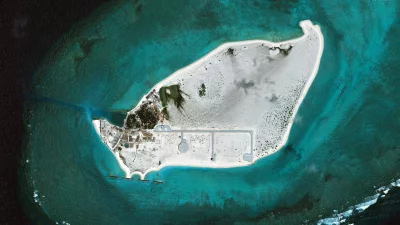
Trung Quốc xây dựng mạng lưới radar tối tân bao phủ Biển Đông
Trung Quốc đang xây dựng Đảo Tri Tôn ở Quần Đảo Hoàng Sa thành căn cứ tình báo quân sự, tạo dựng mạng lưới giám sát chống tàng hình bao
THE HAWAII STATE LEGISLATURE CERTIFICATE
COMMEMORATING THE 50TH ANNIVERSARY OF THE INVASION OF VIETNAM’S PARACEL ISLANDS
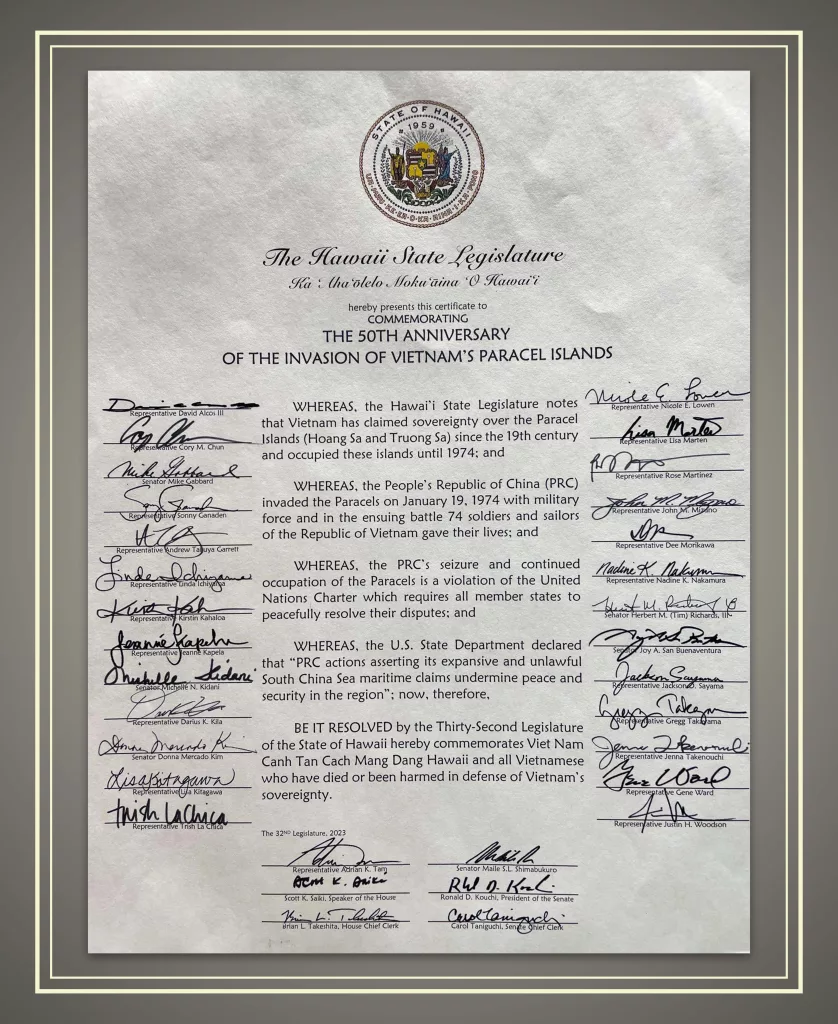
CITY OF WESTMINSTER, CALIFORNIA PROCLAMATION
COMMEMORATING THE 50TH ANNIVERSARY OF THE INVASION OF VIETNAM’S PARACEL ISLANDS
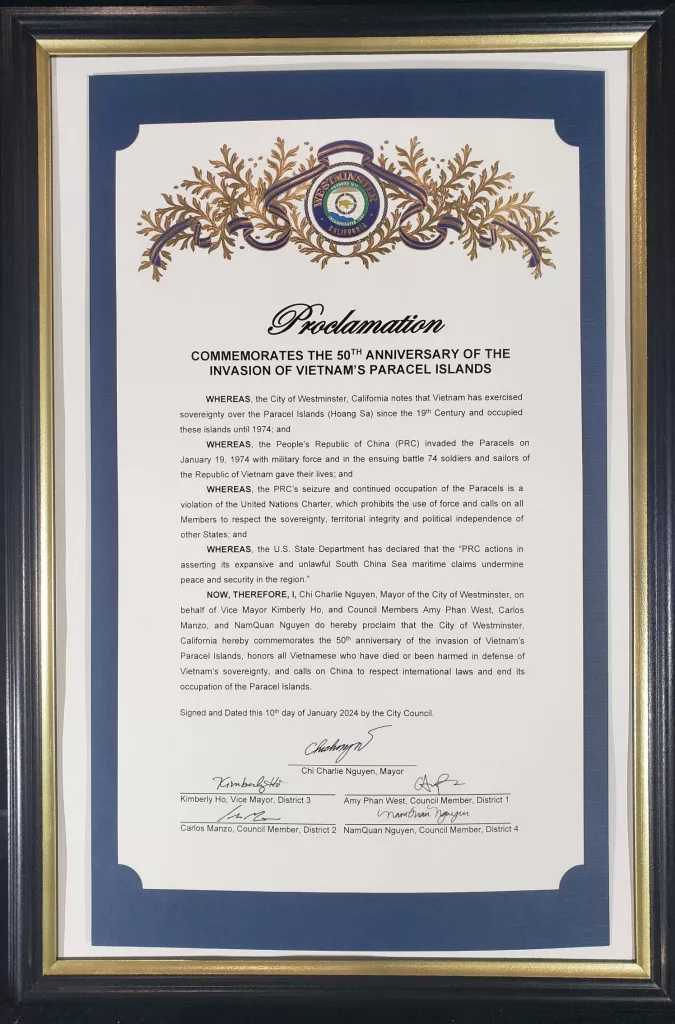
COMMENDATION BY CITY OF SAN JOSE, CALIFORNIA
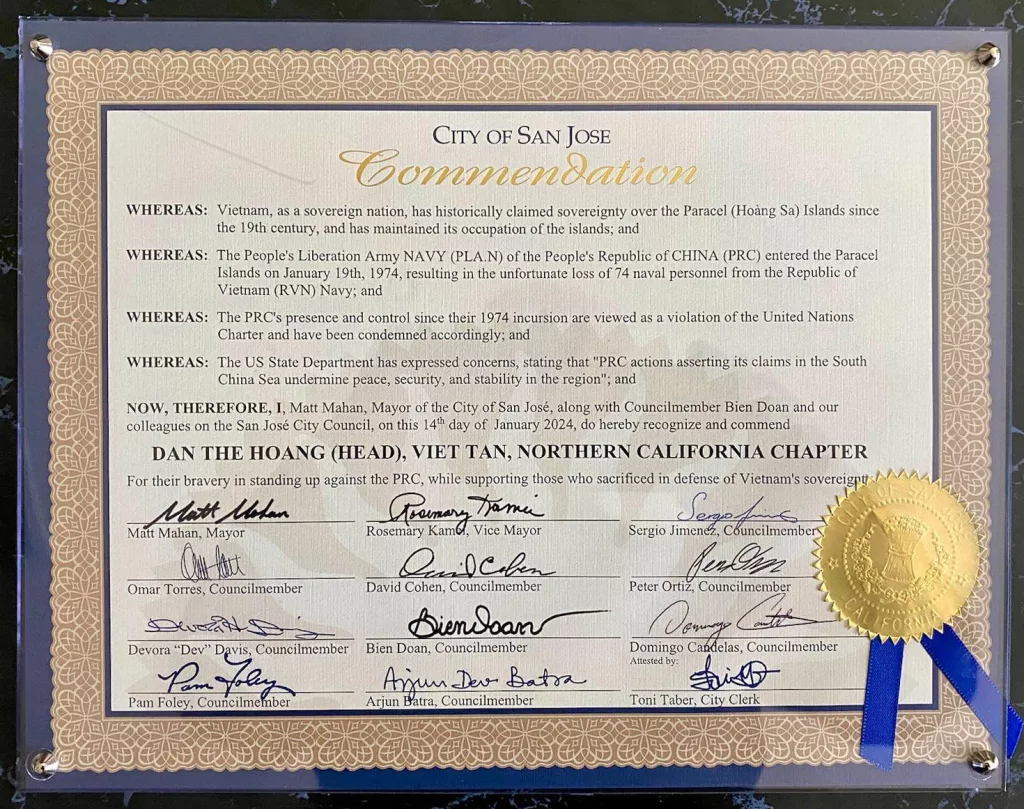
RESOLUTION BY SENATOR DAVE CORTESE – 15TH SENATORIAL DISTRICT, CALIFORNIA
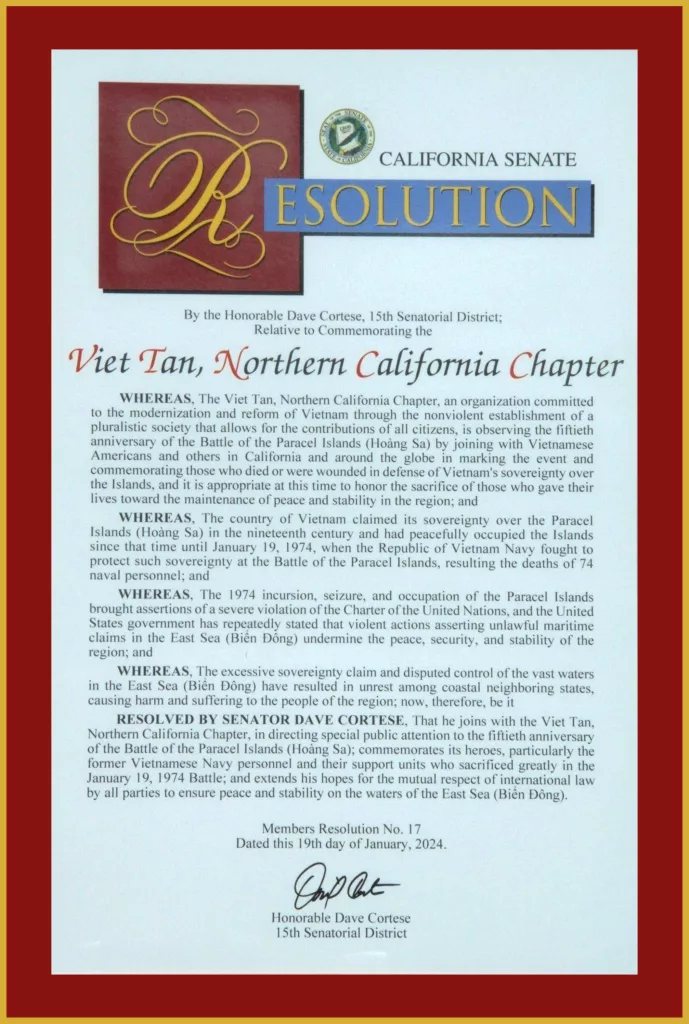
PROCLAMATION BY THE BOARD OF COUNTY COMMISSIONERS OF HILLSBOROUGH COUNTY, FLORIDA
50TH ANNIVERSARY OF THE BATTLE OF VIETNAM PARACEL ISLANDS DAY
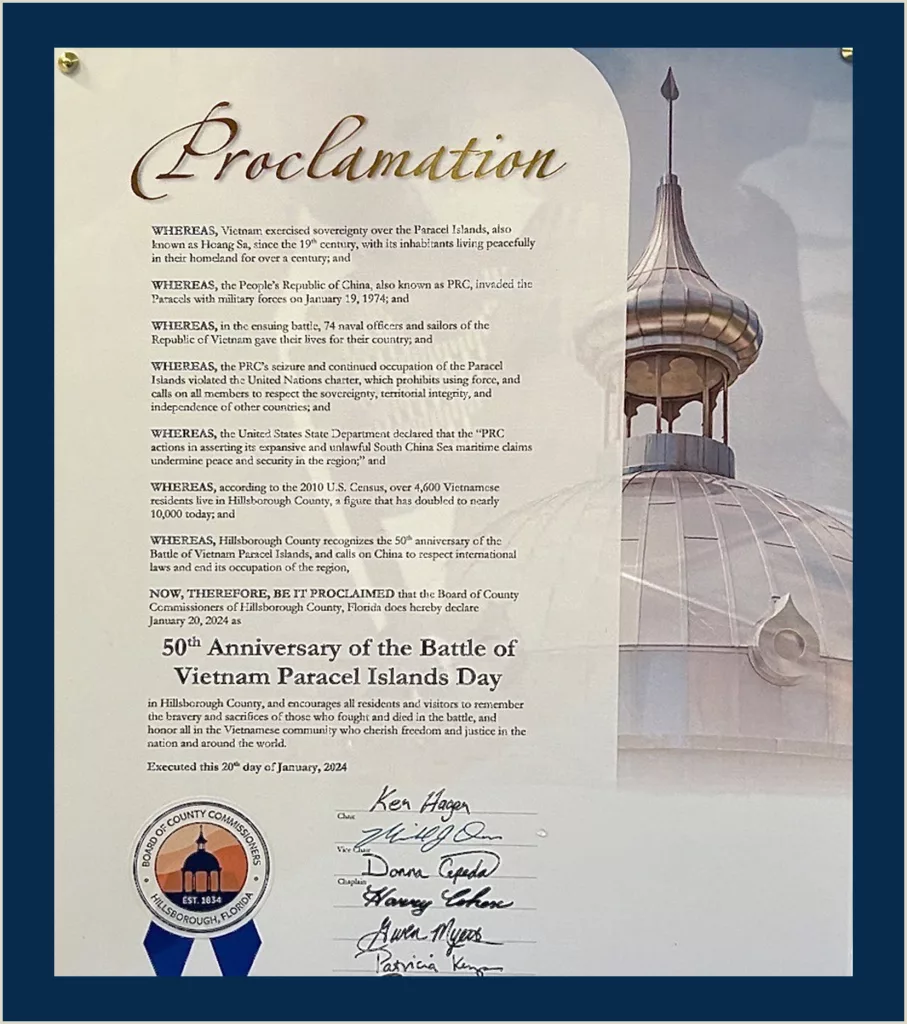
Kính gửi:
– Các Lãnh đạo AUKUS và Quad
– Tổng Thư Ký Liên Hiệp Quốc António Guterres
– Tổng Thư Ký Tòa Án Trọng Tài Thường Trực Marcin Czepelak
Ngày 19 tháng 1 năm 2024 đánh dấu 50 năm quân đội Cộng hòa Nhân Dân Trung Hoa xâm chiếm quần đảo Hoàng Sa của Việt Nam. Sự chiếm đóng bất hợp pháp này chưa bao giờ được cộng đồng quốc tế công nhận và người dân Việt Nam cũng chưa bao giờ chấp nhận.
Triều đại nhà Nguyễn đã tuyên bố chủ quyền đối với quần đảo Hoàng Sa, nằm ngoài khơi bờ biển phía đông của Việt Nam. Các đoàn thám hiểm chính thức và ngư dân Việt Nam thường xuyên ghé vào quần đảo này từ thời đó.
Vào đầu thế kỷ 20, trong thời kỳ Pháp đô hộ Việt Nam đã cho quân đội chiếm đóng quần đảo Hoàng Sa. Tại hội nghị San Francisco về Hiệp ước Hòa bình với Nhật Bản năm 1951, đại diện của Quốc Gia Việt Nam đã tái khẳng định chủ quyền của Việt Nam đối với quần đảo Hoàng Sa. Năm 1955, Việt Nam Cộng Hòa đóng quân tại đảo Hoàng Sa (Pattle), đảo lớn nhất trong nhóm đảo Lưỡi Liềm ở Hoàng Sa, để xác nhận chủ quyền lãnh thổ của mình.
Vào ngày 19 tháng 1 năm 1974, các lực lượng quân sự Trung Quốc đã tấn công đơn vị đồn trú của Việt Nam và trong trận hải chiến sau đó, 74 sĩ quan và thủy thủ Việt Nam đã hy sinh. Việt Nam Cộng Hòa đã chính thức phản đối lên Liên Hiệp Quốc, nhưng Bắc Kinh đã sử dụng quyền phủ quyết của mình tại Hội Đồng Bảo An Liên Hiệp Quốc để ngăn chặn sự việc được đưa ra tranh luận.
Với kiến nghị thư này chúng tôi khẳng định:
Trân trọng,






















Trung Quốc đang xây dựng Đảo Tri Tôn ở Quần Đảo Hoàng Sa thành căn cứ tình báo quân sự, tạo dựng mạng lưới giám sát chống tàng hình bao
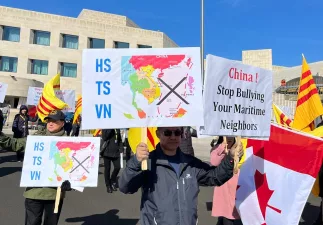
Luna Pham – Những hành động thù địch của Trung Quốc đối với tàu cá của Việt Nam cho thấy rõ tranh chấp của hai quốc gia láng giềng đối
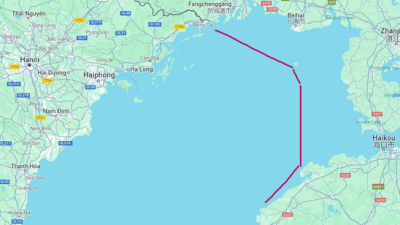
Bộ Ngoại giao Trung Quốc hôm 1 tháng 3, 2024 công bố đường cơ sở thẳng cho phần của mình trong Vịnh Bắc Bộ, khu vực mà hai nước Việt Nam –
A l’attention:
– Des dirigeants d’AUKUS et du Quad
– Du Secrétaire Général des Nations Unies, António Guterres
– Du Secrétaire Général de la Cour Permanente d’Arbitrage, Marcin Czepelak
Le 19 janvier 2024 marque le 50ème anniversaire de l’invasion militaire de la République Populaire de Chine des îles Paracels appartenant au Vietnam. Cette occupation illégale n’a jamais été reconnue par la communauté internationale ni acceptée par le peuple vietnamien.
L’archipel des Paracels (quần đảo Hoàng Sa), situé au large de la côte est du Vietnam, était régulièrement visité par des pêcheurs et des expéditions officielles durant la dynastie des Nguyễn qui revendiquait ces îles.
Au début du XXe siècle, les Paracels étaient occupées par la France, alors puissance coloniale au Vietnam. Lors de la conférence de San Francisco sur le traité de paix avec le Japon en 1951, les représentants de l’État du Vietnam ont réaffirmé la souveraineté du Vietnam sur les Paracels. En 1955, la République du Vietnam stationna des troupes sur l’île de Pattle, la plus grande île du groupe Croissant dans les Paracels, en reconnaissance de ses revendications territoriales.
Le 19 janvier 1974, les forces militaires de la République Populaire de Chine attaquèrent la garnison vietnamienne et lors de la bataille navale qui s’ensuivit, 74 soldats et marins vietnamiens perdirent la vie. La République du Vietnam protesta officiellement auprès des Nations Unies, mais la Chine utilisa son veto au Conseil de Sécurité de l’ONU pour bloquer tout débat.
Nous affirmons par la présente que:
Cordialement,





















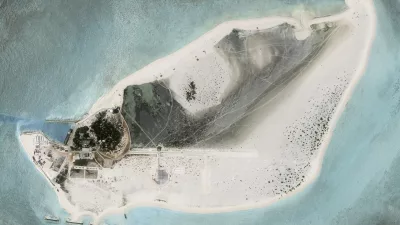
Il s’agit du dernier exemple de militarisation de la mer de Chine méridionale, un processus en cours depuis plusieurs années, qui a reçu une impulsion particulière sous la présidence de

Cet événement a attiré l’attention non seulement de la communauté locale, mais aussi des touristes, offrant ainsi l’occasion aux activistes d’expliquer les preuves historiques et juridiques soutenant la revendication légitime
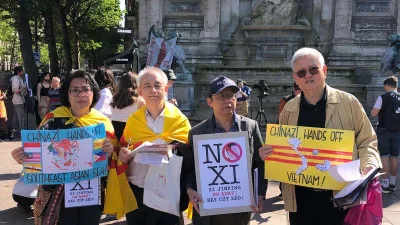
Des activistes passionnés se sont rassemblés à Paris, installant des stands et engageant des discussions avec les résidents et les touristes, afin de collecter des signatures pour une pétition demandant
To:
– Leaders of AUKUS and the Quad
– United Nations Secretary-General António Guterres
– Permanent Court of Arbitration Secretary-General Marcin Czepelak
January 19, 2024 marks the 50th anniversary of China’s military invasion of Vietnam’s Paracel Islands. This illegal occupation has never been recognized by the international community nor accepted by the Vietnamese people.
The Paracel archipelago (quần đảo Hoàng Sa), located off the eastern coast of Vietnam, was regularly visited by fishermen and official expeditions during the Nguyễn dynasty which claimed these islands.
During the early 20th century, the Paracels were occupied by France, the then colonial power in Vietnam. At the 1951 San Francisco conference on the Treaty of Peace with Japan, representatives of the State of Vietnam re-affirmed Vietnam’s sovereignty over the Paracels. In 1955, the Republic of Vietnam stationed troops at Pattle Island, the largest of the Crescent group in the Paracels, in recognition of its territorial claims.
On January 19, 1974, military forces from the People’s Republic of China attacked the Vietnamese garrison and in the ensuing naval battle 74 Vietnamese soldiers and sailors gave their lives. The Republic of Vietnam officially protested to the United Nations, but the PRC used its veto in the UN Security Council to block any debate.
We hereby affirm:
Jointly,






















The discovery of a new radar system on China’s Triton Island military base shows that Beijing is rapidly developing its intelligence capacities in contested waters, write John Pollock and Damien
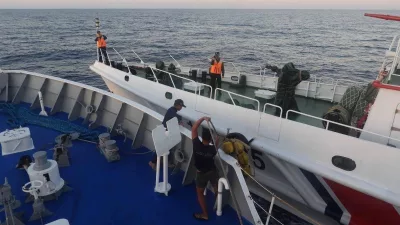
China has officially disclosed a new baseline outlining its territorial claims in the northern part of the Gulf of Tonkin, an area shared with Vietnam. The announcement, made through a
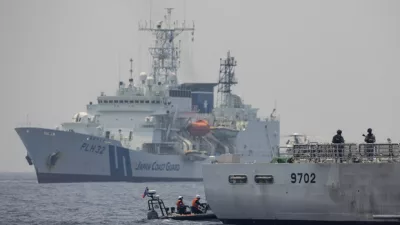
The Japan International Cooperation Agency is preparing a 10-year maritime security support plan for four ASEAN nations – Indonesia, Malaysia, the Philippines and Vietnam – to boost security in the